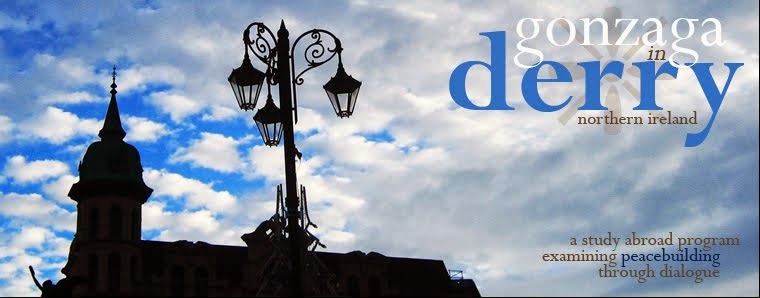 |
| Michael Doherty, Peace and Reconciliation Group |
|
|
By Steve Poole
At the age of 13, Michael Doherty left school and joined the family business in one of the world"s oldest professions. Michael became a barber. He learned his trade along side of his father and carried on the family tradition. The family barbershop was a place where everyone was welcome and it is was an important part of the community. This was especially true on October 5th, 1968. This was the day of the Civil Rights Riot which traveled right past the front door of his family's shop The injured sought and found a place of refuge where they could have their wounds tended and find safety if only for a few moments. Ironically the barbers of ancient Greece and Rome were also looked to as surgeons and healers. It was in this moment that Michael too began his journey towards becoming a healer. Not just the healing of wounds of the flesh, but the healing of hearts and souls and the healing of a community and a nation.
 |
| Peace and Reconciliation Group, founded in 1990 |
The journey would not be without struggle and loss. In 1972 he was present when one of his best friends was killed in the Bloody Sunday riot. In 1974 the family barbershop was blown up by the IRA because they opened their shop to all customers, including the British Army and the police. Michael credits these three events with being the catalyst that moved him to do something to make a difference and to become a peace builder. The path included a return to the classroom in 1979 where he earned a Bachelors in Social Administration and a Master's degree in Public Administration at Magee University.
After graduation, he found himself back among the people, working as the very first Community Relations Officer. Doherty recalls, "no one had a clue what I was supposed to be doing". Michael persevered and began to work with people in the community to develop opportunities and resources to begin conversations and teach communication skills.
 |
| Another Lifeline, By Michael Doherty |
In 1990 the Peace and Reconciliation Group was founded. Doherty recalls that the original purpose was to offer events and opportunities for youth from different parts of the community and different alliances to meet and get to know each other. A few years later, Michael took the role as Executive Director and began to lead the organization in a different direction. His vision was focused on teaching skills for mediation and conflict resolution that might some day lead to a lasting peace. Over the years, his vision for the organization continued to expand. This included a trip to Boston and Philadelphia in 1990 to learn about race relations and conflict resolution from a Quaker approach. Then when President Bill Clinton offered to send him and nineteen others to Fordham Law School for training in mediation and negotiation, he jumped at the chance. When I asked Michael what he had learned from the experts in America, he chuckled and said, "don't do it like the Americans". He explained that what he learned in America was an evaluative style of mediation. In this style of mediation, when there is an impasse, the mediator offers suggestions or advice. Doherty continued, "in the Quaker model you never give advice." It is a style that has worked well for Michael and his organization and has led him to opportunities to travel around the world as a mediator and to bring peace to his own country, as well as other lands.
In 1997 he served on the Parades Commission. This organization grants or denies parade permits to all of the various organizations. This is a position that is highly sought after and extremely demanding and stressful. He ultimately resigned when he was accused by one ot the organizations of denying them a permit for reasons of bias.
 |
| Mural depicting Nobel Peace Prize Winners |
When I asked Micheal what he was most proud of, he thought for a moment and then replied, "when I help to save a life". It would be fair to say that through his work over the years he has helped to save many lives and has much to be proud of. In addition to his work as a trainer and mediator, Michael has also written several books and training manuals on peace building and mediation. His most current book will be released in June, 2014 and is entitled,
The Peace Builders Workbook: For Facilitators working in Divided Societies.
When I asked Michael what comes next for him on this challenging and unexpected journey. He acknowledged that he would not be in this role forever, and one of his responsibilities is to help train the next generation of leaders and peace builders.
Doherty has no illusions about the fragility of the peace process and knows that there is much more work to be done. While the future will likely not be free of violence, he believes that what will be different is how the community responds and that they will not tolerate a return to the past. So, as the people of Northern Ireland pursue their march towards peace, it clear that Michael Doherty remans at the head of that parade.

Very nice Stephen - enjoyed reading the story of Michael Doherty.
ReplyDelete